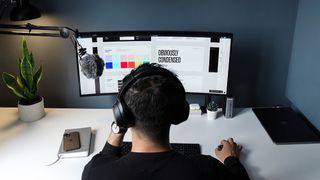Why women need to get involved in public speaking
With web conferences currently dominated by men, prominent female speakers tell us why diversity matters, and how more women can get involved.
We like to think we live in an age of equality, but the web design industry has come under fire many times regarding gender diversity. Conferences in particular frequently boast all-male line-ups or just a tiny number of women.
Some claim it's just the way things turn out, while others reckon women - who are already outnumbered in the industry - just aren't interested in public speaking. Those who do are sometimes seen as a novelty, or branded as token inclusions, despite often being the brightest and best the industry has to offer.
Designer, consultant and Ladies in Tech co-founder Val Head says while she's met plenty of women in the industry, "this just isn't reflected on stage at most conferences". Edgeofmyseat.com founder Rachel Andrew thinks this has led to a problem of normalising uneven ratios: "But the more women who speak, the less unusual we appear, and that is a good thing."
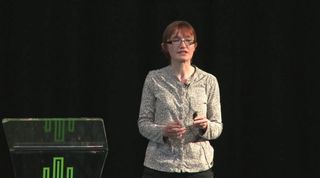
Andrew says as a speaker, web developer and business owner, she wants her biology to not be a talking point, but "the very fact we have to have these conversations asking 'where are all the women?' makes it an issue" - and one that needs to be addressed.
"Having women on-stage is also important for female attendees," she continues. "Almost every time I speak, I'll get a woman come up to me afterwards and say how great it is to see a woman on stage talking about technical topics."
Diversity pays
A List Apart editor-in-chief and content strategist Sara Wachter-Boettcher often talks about women and public speaking, and stresses that getting more women involved is part of a wider aim in terms of diversity: "Yes, we want more inclusivity regarding gender, but also race, age, native language, country of origin, socioeconomic background, ability/disability, everything..."
Although there are moral and humanitarian reasons for following this path, Wachter-Boettcher argues there are also business benefits: "Diversity leads to better products that work for more people, and that are communicated more effectively to their audiences, which lead to more successful companies."
Get top Black Friday deals sent straight to your inbox: Sign up now!
We curate the best offers on creative kit and give our expert recommendations to save you time this Black Friday. Upgrade your setup for less with Creative Bloq.
When it comes to speakers, this means better events, due to a broader range of people on stage offering more perspectives: "It's only when we hear and see new things outside our own viewpoints and experiences that we really learn and grow as professionals."
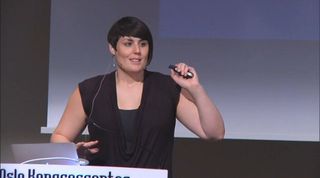
So as a retort to the event organiser that claims no women could be found, or that those asked all said no, or that everyone in a particular field "just happened to be white guys and that's not my fault", Wachter-Boettcher's response is: "Do you want your event to help attendees expand their perspectives and get better at their work? Do you want your industry to be better able to design for a big, wide world?
"Because if you do, diversity is your job, even when it's hard. If you don't care whether your attendees learn and grow - or aren't willing to put in the work to make that happen - then you should stop putting on events, because you're wasting everyone's damn time."
Head has experience in organising conferences, and says those having trouble with diversity would do well to look outside of their usual circles: "Asking around helps. You'll be surprised what kind of awesome people friends and colleagues know. But also keep an eye out for new people all year round, not just during the few weeks you're planning your speaker list."
Comfort zone
There's also the issue of women feeling unwelcome or unsafe at events. Wachter-Boettcher points at examples of women being harassed or assaulted, of which she's had her own experience. While diverse speaker line-ups don't eliminate such risks, she says they can at least make women feel more comfortable and less alone: "It changes the power dynamic from being male-centric to being a bit more balanced, setting a tone of inclusivity that can make it easier to report a problem."
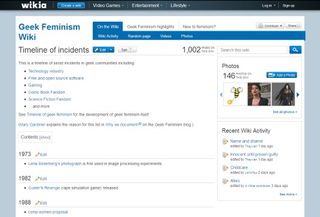
Andrew says she's sometimes seen articles about making women speakers feel more comfortable in other ways, such as in not expecting them to travel from the event to a hotel on their own, but she reckons such thinking should extend to everyone: "I don't want special treatment due to being a woman. Every speaker should be offered a hotel room in a safe part of town, be asked if they want a cab back from a late event, and have someone to contact if they have a concern."
She adds that the more comfortable and secure speakers feel, the better their presentations and interactions with the audience will be. "By contrast, I've spoken at conferences where no-one's even checked I was there until I was by the stage 15 minutes before my slot. Part of a conference organiser's job is to make sure speakers are feeling well, safe and confident, not just counting on the fact they'll show up!"
Getting involved
To some extent, getting involved with public speaking is no different for women or men. Designer and Ladies in Tech co-creator Jenn Lukas says looking for open calls on Lanyrd is a great place to find conferences to submit to, and writing or blogging about a subject demonstrates expertise and could prompt organisers to contact you.
Andrew says to start small, and build your confidence: "Find local events, pitch a talk, and practice a lot. It really does get easier each time. I used to be completely terrified and could barely get my words out. These days, I can cope with craziness such as discovering I won't be able to see my presenter notes five minutes before stepping on-stage and my laptop deciding to power down mid-presentation. It's just about practice."
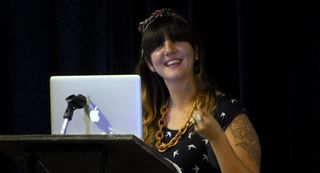
Wachter-Boettcher emphasises having belief in your contributions being valuable, even if you're not an experienced expert: "It's easy to talk yourself out of speaking or tell yourself you've nothing new to say, but if you're excited about an idea, chances are there's a presentation topic in you, waiting to emerge."
She doesn't want to pretend it's perfect out there though: "Be aware of who and what you're getting involved with. Ask questions. Ask for what you need, and make sure you're comfortable with the event and organisers."
Some especially important advice is knowing that how people treat you early on in the process is a good indication about how you'll be treated at the conference: "If your questions aren't answered and needs are written off, you're treated as expendable, or you're talked down to, those are red flags. You need to trust the organiser will have your back if something goes wrong. Your talk's material should be what puts you out of your comfort zone, not the way the conference organisers interact with you."
Ladies in Tech
Belief and confidence don't come easily, though. "You think: who are you to have opinions and needs and questions. But without speakers, there'd be no conferences," advises Wachter-Boettcher, who reasons speakers therefore deserve respect.
In order to become more confident, negotiate fees or request special equipment, she says honing a talk's message is vital, and this was the basis of an inaugural workshop that took place in partnership with Ladies in Tech.
Ladies in Tech was founded in 2013, providing stories from existing women speakers and resources for new speakers. It's now also an organisation offering meet-ups in Philadelphia and hoping to soon expand to other cities. "I love that it's all about celebrating and supporting women who want to speak — it's a very positive, empowering approach, and that's valuable," says Wachter-Boettcher.
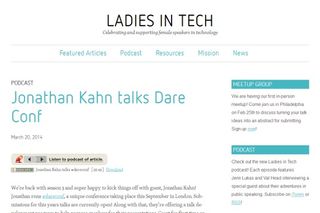
Lukas elaborates on the reasoning behind the group's initial meeting: "Sometimes we know what interests us, but not what to do with our ideas. In the meet-up, we talked about how to flesh out an idea on the way to creating a full talk and a thorough abstract for conference submission."
Wachter-Boettcher acknowledges that submitting a speaking proposal is of course daunting for anyone, but explains women are especially likely to opt out of doing so: "They often lack mentors, bosses, or peers who encourage them to get over those fears. Our goal was to create a safe environment for women to start getting more comfortable expressing their ideas and communicating them to others, and to eliminate some of the question marks around the process."
Looking ahead
Subsequent meet-ups will further explore the elements of speaking, with the next offering 'lightning talk' slots; attendees can try out a short talk, which will be videoed. "This will be something they can then use to help work on their delivery, or use as part of the submission process for conferences that ask for a video of a past talk," explains Head.
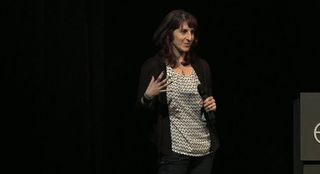
Wachter-Boettcher is positive about the progress achieved so far, and says she "loves working with Ladies in Tech," but she's also keen to point out the subject of women and public speaking is complex: "There are a lot of issues to be tackled, and some of the solutions will be less sparkly and positive than Ladies in Tech."
She asserts it's not just on women's groups to get women speaking - that's only one form of outreach and action, which won't solve the problem alone: "We also need people calling out abuses at events, enacting codes of conduct, holding male-dominated events and organisations accountable, and a million other things to make the kind of change happen that's really needed."
Words: Craig Grannell Main photo: Eirik Helland Urke
Craig Grannell is an editor, writer and designer.

Thank you for reading 5 articles this month* Join now for unlimited access
Enjoy your first month for just £1 / $1 / €1
*Read 5 free articles per month without a subscription

Join now for unlimited access
Try first month for just £1 / $1 / €1
The Creative Bloq team is made up of a group of design fans, and has changed and evolved since Creative Bloq began back in 2012. The current website team consists of eight full-time members of staff: Editor Georgia Coggan, Deputy Editor Rosie Hilder, Ecommerce Editor Beren Neale, Senior News Editor Daniel Piper, Editor, Digital Art and 3D Ian Dean, Tech Reviews Editor Erlingur Einarsson and Ecommerce Writer Beth Nicholls and Staff Writer Natalie Fear, as well as a roster of freelancers from around the world. The 3D World and ImagineFX magazine teams also pitch in, ensuring that content from 3D World and ImagineFX is represented on Creative Bloq.


